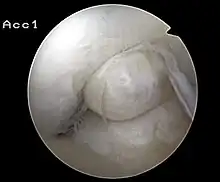Zyklops
Der Zyklops (engl. cyclops lesion) ist eine meist nach einer Kreuzbandplastik des Kniegelenks auftretende Komplikation.

Arthroskopische Aufnahme eines Zyklops im Knie eines Patienten.
Beim Zyklops handelt es sich um Narbengewebe im vorderen Gelenkraum, welches den Bandersatz einbezieht und mechanisch verhindern kann, dass die volle Streckung erreicht werden kann. Diese Veränderung tritt nach ca. 15 % der Operationen auf, führt aber nur bei 2 % der Patienten zu einer merkbaren Streckhemmung.[1] Der Zyklops muss dann in solchen Fällen meist chirurgisch entfernt werden.[2]
Die Bezeichnung wurde von den kalifornischen Orthopäden D. W. Jackson und R. K. Schaefer geprägt, die das arthroskopische Erscheinungsbild des Narbenknotens mit umgebenden Blutgefäßen an einen Kyklopen erinnert hatte.[3]
Einzelnachweise
- J. Wang und Y. Ao: Analysis of different kinds of cyclops lesions with or without extension loss. In: Arthroscopy 25, 2009, S. 626–631. PMID 19501293
- Arthrofibrosis from ACL Injuries. Wheeless' Textbook of Orthopaedics, online
- D. W. Jackson und R. K. Schaefer: Cyclops syndrome: loss of extension following intra-articular anterior cruciate ligament reconstruction. In: Arthroscopy 3, 1990, S. 171–178. PMID 2206179
Weiterführende Literatur
- B. R. Runyan u. a.: Cyclops lesions that occur in the absence of prior anterior ligament reconstruction. In: Radiographics 27, 2007, S. e26. PMID 17712103
- S. J. Kim u. a.: Synovitic cyclops syndrome caused by a Kennedy ligament augmentation device. In: Arthroscopy 19, 2003, S. E38. PMID 12671613
- M. Veselko u. a.: Cyclops syndrome occurring after partial rupture of the anterior cruciate ligament not treated by surgical reconstruction. In: Arthroscopy 16, 2000, S. 328–331. PMID 10750015
This article is issued from Wikipedia. The text is licensed under Creative Commons - Attribution - Sharealike. Additional terms may apply for the media files.